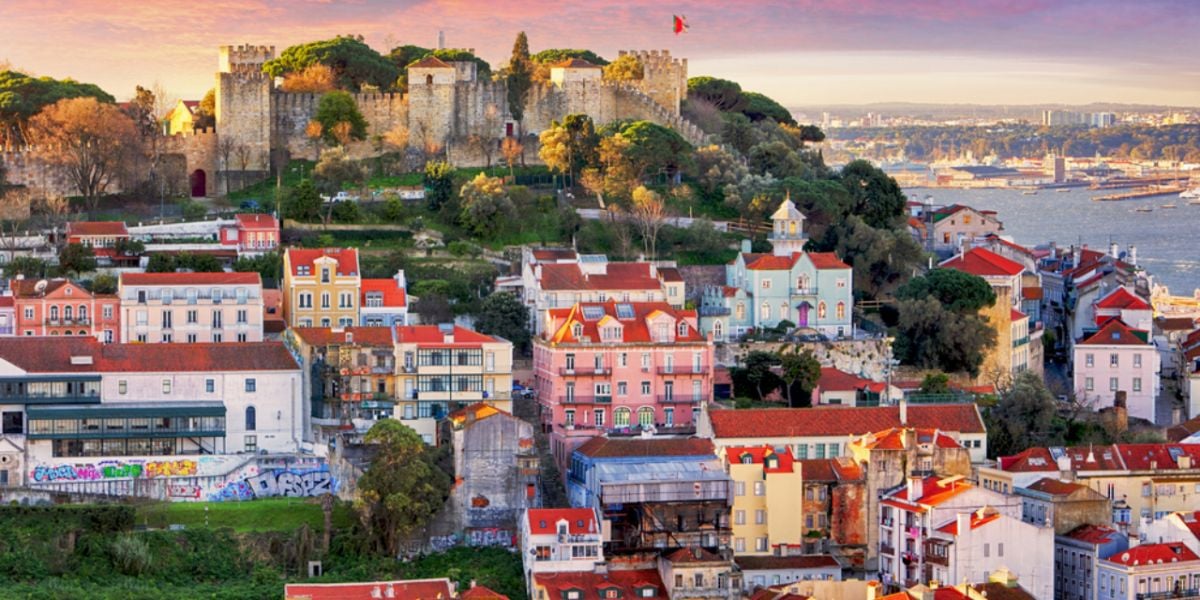
With a thriving expat community, a cost of living that—although rising—is still somewhat affordable for most Americans and Western Europeans, and good weather all year round, Lisbon is an extremely popular city among the digital nomad community. However, its popularity sometimes doubles down as its downfall, as accommodation in Lisbon is increasingly more challenging to find. Find out whether you should rent or buy in Lisbon, how to find a place to rent, the process behind signing a lease, and what the best areas in the city are.
That being said, it is definitely worth beginning your search well before you plan to relocate. The best months are usually before the summer (especially May, June and July) when the students finish their studies and more flats are vacated. On the other hand, expect a harder time after September, when prices skyrocket due to higher demand. Be that as it may, things are getting so out of hand that even students are struggling to find a bedroom, with most families not being able to afford the cost of studying in Lisbon due to the shortage of accommodation.
Should you rent or buy property in Lisbon?
How you go about your accommodation search in Lisbon depends on whether you want to rent or buy. Naturally, there are lots of factors that will affect your decision here, from the length of your stay to budget considerations and more. Both options come with benefits and challenges of their own — and it's a good idea to do a generous amount of research before making your decision.
Renting accommodation in Lisbon definitely offers more flexibility. You will be able to switch apartments, move to a different city, and basically not have anything substantial holding you down in Lisbon. However, you also need to keep in mind that renting options may be quite limited in popular areas.
Be that as it may, if you're looking into renting a place in the capital, expect to pay accordingly. In fact, according to the Housing Anywhere International Rent Index, average rent prices for an apartment in the city in the first quarter of 2025 hover at around €1,750, while a small studio will set you back €1,056/month. Although rent prices went down by 2% compared to 2024, these figures are still higher than the likes of Paris, Berlin, Madrid or Milan. Unfortunately, things aren't looking any better outside the downtown area, where prices for renting a modest bedroom in a shared apartment can currently set you back 490€/month (a 6.6% drop from 2023). Furthermore, new leasing contracts signed in May 2025 have shown that rent prices have gone up 4% compared to May 2024, reaching an average of €22,40/month per square meter.
Buying property in Lisbon, on the other hand, can be a better option if you plan to stay in the city for a long time and have found a suitable property. While many foreign investors used to buy 500,000€ worth of property in order to get access to the Golden Visa Scheme, allowing them to live legally in the country and apply for citizenship after 5 years, the government has suspended the program in Lisbon, Porto and the Algarve (and extended the time required for citizenship to 10 years). While expats in Lisbon can still take advantage of the Golden Visa Scheme, doing it by buying property is off the table for now. Furthermore, new legislation to tackle speculation and high prices has deemed it illegal to open up new Airbnb's in Lisbon and Porto, so you won't be able to rent your property to tourists (legally) if you're away from the city.
Regarding prices, since January 2015, the average square meter price in Lisbon has gone up from 1,300€ to a staggering 4,360€. In central Lisbon, in neighborhoods like Baixa, Bairro Alto, Chiado and Rossio, property prices have risen to 5720€ per square meter (May 2025 figures), an extraordinary 160% leap in just a little over 10 years! According to stats from Imovirtual, one of the country's biggest real estate portals, average listings in Lisbon cost 650,000€, a 33% spike compared to 2024.
The process of buying property in Lisbon is rather straightforward, but can also be complicated if you are not familiar with how things work and do not speak the language. It is, thus, strongly advised to rely on a real estate agency and a legal consultant. Some of the biggest real estate agencies in Lisbon are Remax, ERA, Century 21 and Imovirtual, among others.
Whether you choose to buy or rent in Lisbon, it's absolutely essential that you invest a generous amount of time into doing market research. Navigating the real estate market in a foreign country can be an overwhelming process — and it's important to come prepared. It may also be helpful to look through our Lisbon forum for more hands-on advice on renting and buying property in Lisbon.
How to find a place to rent in Lisbon
Online searching is the best way to find accommodation in Lisbon, with all major rental agencies listing properties online. Short-term rentals can be found on Airbnb, but the prices are usually higher as you are competing with tourists looking for holiday accommodation. In Lisbon, as in other popular European cities, many property owners are turning to holiday rentals to meet the needs of the tourism market, which often means there are fewer (and more expensive) options left for residents and expats. However, the local government seems keen on ending this, having approved legislation that suspends licensing for all new Airbnbs in the city.
Major rental websites in Lisbon include Sapo, OLX, Remax and Idealista. If you are already in Lisbon, contact multiple real estate agencies, as they can help you find a property within your budget, but be prepared to pay their hefty fees. A real estate agent will be especially helpful if you are not fluent in Portuguese. Another place to look is the Facebook Marketplace, which offers better prices and quicker responses.
Accommodation is likely to come partially furnished, usually with an equipped kitchen and some pieces like a bed or even a couch, although fully furnished flats can be found as well. Newer, renovated, and more traditional apartments and homes are available. While older homes can have a rustic charm, they are more likely to have structural or plumbing problems, so some may prefer newer buildings for peace of mind. However, if renting, any repairs and building maintenance should be done by the landlord.
Signing a lease in Lisbon
To rent a property in Lisbon, you will need to sign a lease agreement (contrato de arrendamento). To sign the lease, you will need to have a Portuguese Tax ID (número de contribuinte). This is basically a fiscal identification number that you can get from your local tax office in Lisbon. You may also be asked for references and a credit check.
The lease agreement generally includes basic information about the tenant and landlord, rental conditions, the state of the property, rent amount, duration of the lease, etc. The lease will also include a list of items that come included with the property: furniture, appliances, etc. You will then be responsible for leaving the property in the condition that it was rented to you, with allowance for some regular wear and tear, of course.
If you want to move out of a rented property before the contract expires, you will need to give notice to your landlord ahead of time. Generally, if you have less than a year left on your contract, you should try to give your notice 60 days in advance.
Your landlord also has the right to serve you with a notice — for instance, if they need the home for themselves or if renovation needs to take place that requires the home to be empty. In this case, you may be compensated, or the landlord may help you find a comparable property to relocate to.
At the end of your lease, the landlord will inspect the property — and if no major damage is found, your deposit (usually the equivalent to 1-month's rent) will be returned. If you have a deposit-related dispute with your landlord, you will need to go through the Civil Court to resolve the issue. Overall, the laws in Portugal tend to favor the tenant over the landlord. In fact, landlords may actually have a hard time getting rid of long-term renters if they refuse to leave.
With that, it is still important to be vigilant and exercise due diligence when signing lease contracts:
If your tenancy agreement is drafted in Portuguese, consider having it officially translated before signing.
If you don't speak Portuguese and your landlord doesn't speak English (or another language that you may have in common), it's also best to have a translator present to make sure there are no misunderstandings as to the conditions of the lease.
Before committing to rent a property, check if your landlord has a legal rental license granted by the local council.
Neighborhoods in Lisbon
Lisbon has many attractive neighborhoods, which are popular with expats. Bairro Alto and Baixa are both beautiful and within the city center, offering stunning architecture, cafes and many options for shopping and dining. Plus, Bairro Alto is also considered a staple of Lisbon's nightlife, with plenty of bars and loud music all night long. Nearby Chiado is also trendy, especially among younger people, who enjoy its food and wine scene. However, these areas are also regarded as being among the most expensive in the city, starting at 2,000€ for a one-bedroom apartment (and averaging 2,500€).
Benfica is more removed from the city center but offers large parks, open spaces and fast public transportation to the city. Affordable housing options used to be found here, but they've become increasingly scarce. Another suburb for those who prefer to be in a quieter area is Restelo, on Lisbon's western side. Restelo is popular with families, as it offers many parks and open spaces and is a predominantly residential area. Penha de França, Intendente and Anjos are neighborhoods that are about 15 minutes from the city center and used to offer a more diverse price range as well.
On the other hand, the central area of Martim Moniz may be a good option for the budget-conscious. Due to the high concentration of immigrants (especially from South Asia) and recurring issues with drug trafficking, the neighborhood has a terrible reputation. However, a big part of it is fueled by the far-right's bigoted speech, as Martim Moniz can still be considered quite safe. Sure, it may look a bit rough around the edges, but at the same time, it can deliver great bang for your buck.
Moreover, even the areas where the middle class used to reside have become too expensive for the average Portuguese worker, though these districts – such as Odivelas, Loures or Amadora – can still offer a good bargain for budget-savvy expats (rent starting from 1,000€ for a small one-bedroom apartment). On the other hand, if you're running on a pretty tight budget and don't mind living quite far away from the city center, you may look up your options in Sobral do Monte Agraço, Azambuja and Arruda dos Vinhos, about 50 km away from the downtown.
We do our best to provide accurate and up to date information. However, if you have noticed any inaccuracies in this article, please let us know in the comments section below.








